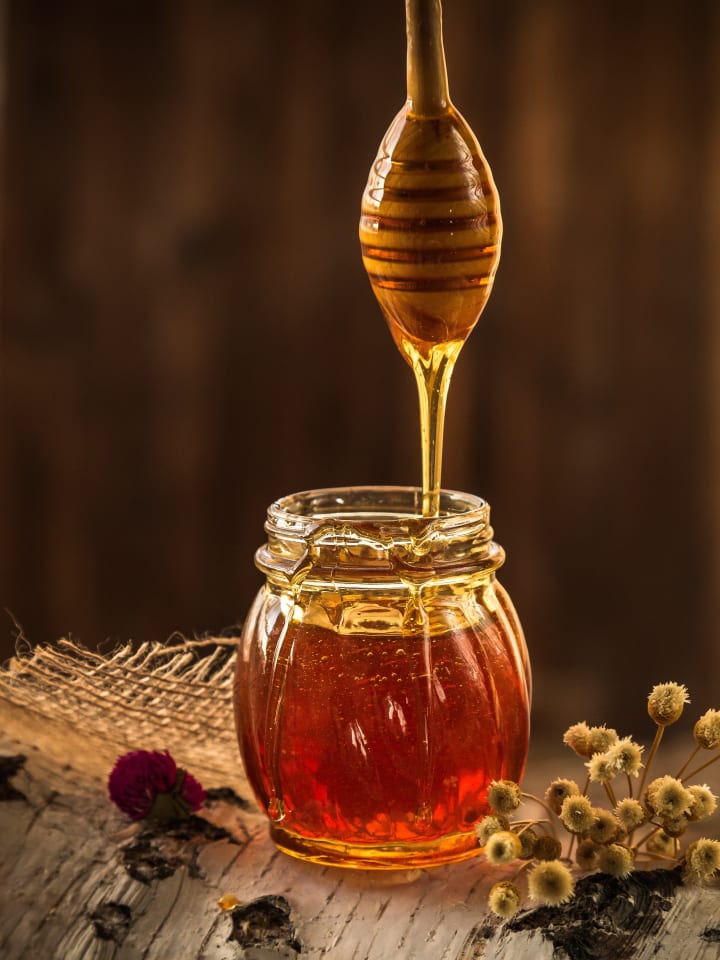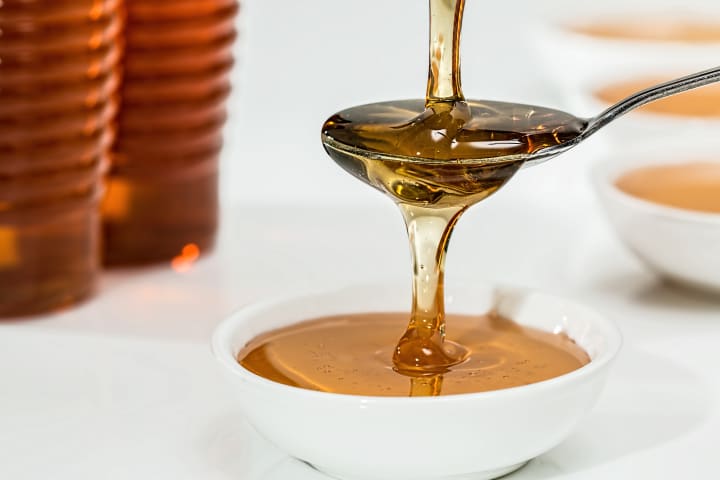benefits of honey
benefits of honey

Learn about the most important benefits of honey
The benefits of honey have been known to man since time immemorial, so you can learn about the most important of these benefits through the following article.
The benefits of honey are many, and have been known for thousands of years, as honey has been used in various ways, whether as food for the body or as an ointment to treat burns, infections and other diseases, so what are the most important other benefits of honey?
benifits of Honey
The benefits of honey are related to many health properties that accrue to the human body, the most important of which are:
1- A source of energy for adults and children
Honey is considered a high-value food and is used as food for children and adults. It is the only local substance that is not man-made and its consumption as food does not require refining. Honey can be preserved for a long time when stored properly.
Honey compensates for the sugars consumed due to the person's physical or mental effort, and it may also be used to treat cases of weight loss and thinness.

2- Antibacterial and antimicrobial
Honey is similar to antibiotics as it has the ability to kill many microbes, viruses and fungi. It also interacts with cells in the body to secrete antiseptic substances that reduce inflammation and poisoning.
3- Reducing the level of fat in the body
As an alternative to refined and manufactured sweeteners, honey contributes to the prevention of many: obesity problems, heart disease and atherosclerosis, as it was found to play a role in reducing cholesterol and lipids in the blood.
4- Prevention of diseases of the digestive system
Unlike refined and simple sugars such as; Sucrose, honey does not ferment in the stomach as it does not stay for long as it is quickly digested, thus posing no risk of bacterial invasion, and passes directly from the small intestine into the bloodstream without causing any irritation in our digestive system as sucrose does.
One of the clinical trials found that one of the benefits of honey is that it helps treat:
Indigestion.
Bowel infections as well as the treatment of constipation, it is considered a mild laxative, as it increases bowel activity.
Digestive disorders, as it eliminates excess acidity in the stomach, which often leads to ulcers.
Many doctors have used honey to treat stomach and duodenal ulcers.
The benefits of honey that will make you eat it daily

5- Preserving teeth and protecting gums
Honey plays an essential role in preserving teeth and preventing them from decay and their proper growth. It also plays a role in strengthening and protecting the gums.
6- Prevention of cancer
Honey contains vitamins and antioxidants. In fact, one of the unique antioxidants called Pinocembrin is found only in honey. Antioxidants are known to play a major role in preventing cancer and preventing the proliferation of cancer cells, especially in cases of esophageal cancer. mouth, intestines and stomach.
7- Cough treatment
According to many researches, honey is an effective and safe treatment for children’s cough from over-the-counter medicines. It helps remove phlegm and throat infections and relieve cough. Thus, it is included in the manufacture of many cough medicines.
8- Enhancing and increasing blood hemoglobin
Many researches have found that honey has an effective role in regulating blood pressure and increasing hemoglobin in it.
9- A good choice for athletes
Honey is a source of energy for the body and raising the level of blood sugar (glucose) in a short period, and thus it is considered the perfect choice to provide athletes with energy and help them train and do physical effort.
Also, using it as a source of carbohydrates during exercise helps to significantly improve performance, especially during endurance races and cycling.
10- Treating wounds and burns
Honey contains the enzyme responsible for producing hydrogen peroxide, which makes it useful in treating wounds, relieving pain, disinfecting them, and preventing germs and bacteria from growing by creating an acidic environment, thus preventing inflammation.
Many studies have shown that the topical use of honey on superficial burns helps in healing them in a large and effective manner and helps in faster healing of wounds.
11- Good for skin, skin and eyes
It was found that honey has its benefits on the skin and skin, as honey helps:
Skin purification.
It is used to treat eczema, psoriasis and acne, as it contains antibacterial properties.
Honey contributes to relieving dry skin and cracks in the feet.
Thus, it is included in the manufacture of many cosmetics and soaps that help the skin’s freshness, and it is also used in the preparation of eye ointments, as it is useful in treating eyelid and corneal infections and ulcers.
12- It has an effect on the nervous system
Honey is a sedative for the body, so eating it before bedtime contributes to calming the nervous system and overcoming some sleep disorders such as insomnia.

components of honey
After we got acquainted with the most important potential benefits of honey, we must now mention its most important basic components, as honey is a source of carbohydrates, as a tablespoon of it provides us with approximately 64 calories, and honey mainly consists of:
76% natural sugar (mostly fructose and glucose), and due to its high level of fructose (fructose), honey is sweeter than table sugar.
18% of water, and the lower the percentage of water in honey, the better its quality.
6% of its ingredients are minerals, vitamins, pollen and proteins.
As for its nutritional content, it is characterized by the following:
Vitamins: A small percentage of vitamins, the most important of which are: vitamin B6, thiamine, niacin, riboflavin, pantothenic acid and some amino acids.
Minerals: Small percentages of minerals, which include: calcium, copper, iron, magnesium, manganese, phosphorus, potassium, sodium and zinc.
Antibacterial materials.
Antioxidants: quot; riboflavinoids;
In addition, it is considered free of fat and cholesterol.






Comments
There are no comments for this story
Be the first to respond and start the conversation.